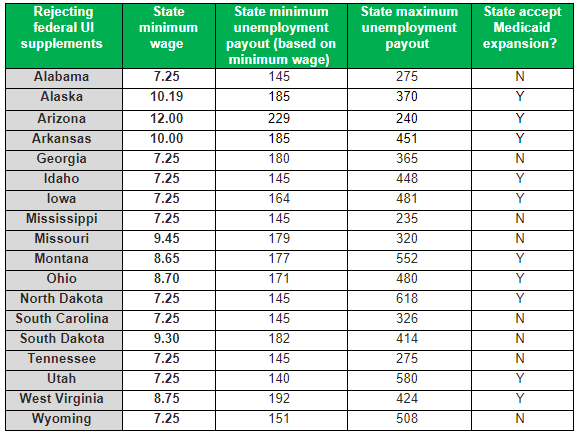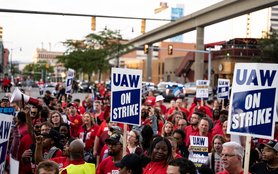Many of us celebrated when the American Rescue Plan Act included federal supplements to unemployment benefits. The extra $300 a week offers a lifeline to countless working families. However, most Republican governors are making the alarming decision to turn down the help. What the heck is going on?
UPDATE JUNE 4, 2021: Since this piece was published, an additional seven Republican governors opted out of federal unemployment programs, meaning that a full half of all the states (25) are denying supplemental benefits to unemployed workers. A report from Congress's Joint Economic Committee finds this will cost local economies more than $12 billion. Advocates are increasingly concerned that the cut-off of pandemic benefits disproportionately hurts people of color (unemployment rates for Black, Latinx, and Asian workers are higher than for White workers), especially in the GOP-led states.
_____________________________________
On the surface, it looks like little more than cruelty, and partisan posturing. To date, 18 Republican governors have announced that their states will decline federal pandemic unemployment benefits.* Roughly two million workers may be cut off early.
What happens when workers are left to rely solely on state benefits? It can spell financial disaster. State benefits can be paltry, as we learned while researching the Best States to Work During COVID-19. (See table at bottom.)
For example, in Mississippi, the maximum payout is $235 a week, regardless of previous earnings. And also no matter the monthly burden on households, from housing to food to utilities.
Moreover, the federal supplements cover workers who might not be eligible for state benefits, including gig workers and the long-term unemployed.
So why would a governor opt to turn down help delivered at no cost to the state?
The claim: People are refusing to work because of robust benefits.
The reality: Businesses want to make profits off a desperate workforce. They plan to compel people to return to poverty-level wages, inadequate protections from COVID-19, and lack of childcare. And the people facing this impossible choice? Disproportionately Black, immigrant, and female.
Businesses lament a "labor shortage"
It’s all over the news: businesses claiming that people are refusing to work, pointing to the recent jobs report as proof. However, numerous studies have found that supplements do not discourage people from returning to work. When JP Morgan Chase Institute investigated the impact of the $600 supplement in the CARES Act last year, it found scant impact on return to work.
To be fair, workers are practical, and may follow the route that enables them to sustain their families. It’s difficult to turn down an option that brings in more money in the midst of a pandemic. (Even though, it should be stressed, the law requires them to keep looking for work, and to accept work when offered; otherwise, benefits halt.)
However, this compels employers to be logical as well. If they need people to return, they should offer attractive wages. But many balk at paying more than the mandated minimum wage: $7.25 an hour in many states--officially below the federal poverty line for a household of two.
At a moment when major business consortiums are heavily lobbying Congress against a raise in the federal minimum wage (stuck for 11 years at $7.25), the real motivations are clear: depress labor costs, and elevate profits, executive compensation, and shareholder returns.
Why people may not go back to work
First, let’s remember that millions of people ARE going back to work. More than 14.1 million jobs have returned since the low in April 2020.
Second, we are still far short of the number of jobs we had in February 2020--by about a million. Those workers NEED the unemployment supplement to get by.
Third, there are many legitimate reasons not to return.
- The pandemic is far from over. Millions are not fully vaccinated; and there is STILL no mandate to require employers to provide adequate safeguards.
The announcement from the Centers for Disease Control last week that vaccinated people don’t need to wear masks prompted many large employers to lift mask mandates. Needless to say, countless unvaccinated people will also decline to wear masks, increasing the risk to workers. (See more about the need for an Emergency Temporary Standard from OSHA.) - Care options are scarce. Millions are still providing care at home that was previously covered by institutions (schools, childcare centers, facilities for elderly).
- Many jobs are gone. COVID-19 had a wildly disproportionate impact; in many communities--especially those with high poverty rates--businesses shut down for good. Those jobs are not coming back, and those workers can’t easily pick up and move.
- Employers are taking advantage of the desperation. Coming out of a recession, many workers hope to find not just better wages, but also safer conditions and respect. Instead, they’re finding that employers are capitalizing on a moment when people feel anxious, keeping wages low and protections lax.
Punishing marginalized populations
Now let’s consider WHO is relying on the supplement, and what it means about these governors.
The unemployment rate for Black workers stands at 10 percent, versus 5.9 percent for White workers. One in ten Black workers relies on unemployment to keep the lights on.
Black and Hispanic people have received smaller shares of vaccinations compared to their shares of cases and total population in most states. Moreover, many of the states refusing the supplements also rejected Medicaid expansion, leaving millions of poor people without access to healthcare.
Joi Owens, Oxfam Program Lead, Gulf Coast, points to the devastating impact on the largely Black rural communities in the Mississippi Delta, where businesses closed up and left. Many folks don’t have cars; there is no public transportation. If they can’t walk or bike to work, they’re stuck.
Moreover, Black communities saw not just more job loss; they also saw higher rates of infections and fatalities, as a result of factors such as inadequate healthcare, poor nutrition, higher rates of poverty and substandard housing.
What does recovery really mean?
In the early days of the pandemic, when people suddenly appreciated “essential” workers, there was a wave of sentiment that we can’t go back to “normal.” Workers need better: higher wages, safer conditions, dignity.
While the American Rescue Plan Act has vital seeds to a brighter future, it’s still possible for governors to dash that hope. They can choose to pour fuel on the fire of inequality already burning hotter since COVID-19 ravaged marginalized communities.
As EPI notes, “The goal of economic policy should not be to chase as many adults into paid work as possible, it should be to provide good options and economic security for all.”
As Owens notes, “Why should someone be forced to go back to a low-paying job that puts them at risk of contracting a potentially fatal virus?”
Our country can do better in this moment, supporting people rather than profit. We have the tools; we need to use them.
*The federal measures cover: $300 per week supplement (PUC), Pandemic Unemployment Assistance (PUA) for gig workers and others not eligible for UI, and Pandemic Emergency Unemployment Compensation (PEUC) for the long-term unemployed.




